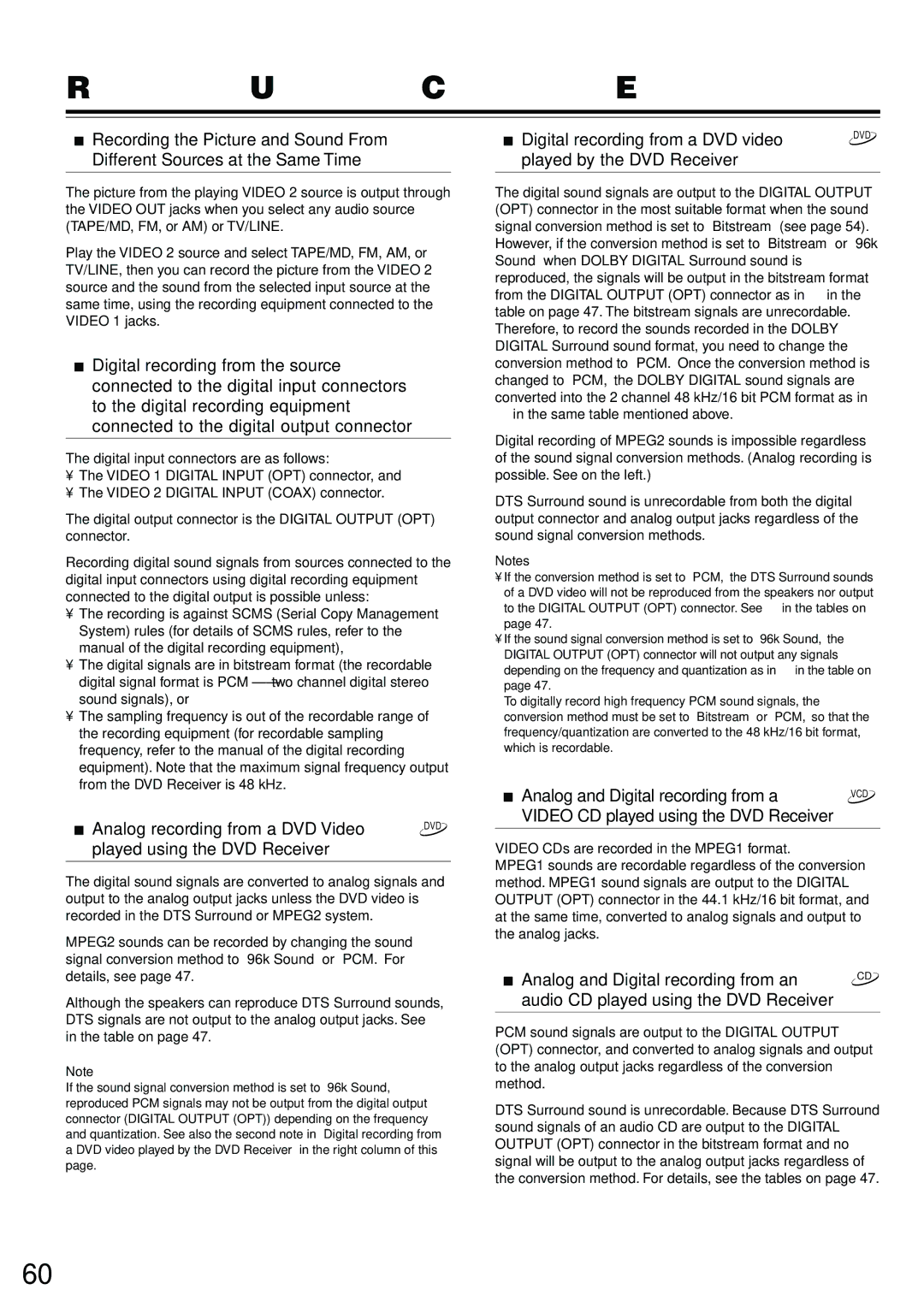
Recording Using the Connected Equipment
Recording the Picture and Sound From Different Sources at the Same Time
The picture from the playing VIDEO 2 source is output through the VIDEO OUT jacks when you select any audio source (TAPE/MD, FM, or AM) or TV/LINE.
Play the VIDEO 2 source and select TAPE/MD, FM, AM, or TV/LINE, then you can record the picture from the VIDEO 2 source and the sound from the selected input source at the same time, using the recording equipment connected to the VIDEO 1 jacks.
Digital recording from the source connected to the digital input connectors to the digital recording equipment connected to the digital output connector
The digital input connectors are as follows:
•The VIDEO 1 DIGITAL INPUT (OPT) connector, and
•The VIDEO 2 DIGITAL INPUT (COAX) connector.
The digital output connector is the DIGITAL OUTPUT (OPT) connector.
Recording digital sound signals from sources connected to the digital input connectors using digital recording equipment connected to the digital output is possible unless:
•The recording is against SCMS (Serial Copy Management System) rules (for details of SCMS rules, refer to the manual of the digital recording equipment),
•The digital signals are in bitstream format (the recordable digital signal format is PCM
•The sampling frequency is out of the recordable range of the recording equipment (for recordable sampling frequency, refer to the manual of the digital recording equipment). Note that the maximum signal frequency output from the DVD Receiver is 48 kHz.
|
| Analog recording from a DVD Video | DVD |
|
|
|
|
| |
|
|
|
| |
|
| played using the DVD Receiver |
|
|
|
|
|
|
|
The digital sound signals are converted to analog signals and output to the analog output jacks unless the DVD video is recorded in the DTS Surround or MPEG2 system.
MPEG2 sounds can be recorded by changing the sound signal conversion method to “96k Sound” or “PCM.” For details, see page 47.
Although the speakers can reproduce DTS Surround sounds, DTS signals are not output to the analog output jacks. See e in the table on page 47.
Note
If the sound signal conversion method is set to “96k Sound,” reproduced PCM signals may not be output from the digital output connector (DIGITAL OUTPUT (OPT)) depending on the frequency and quantization. See also the second note in “Digital recording from a DVD video played by the DVD Receiver” in the right column of this page.
|
|
|
|
|
|
|
|
| Digital recording from a DVD video | DVD |
|
|
|
|
|
|
|
| ||
|
|
|
|
|
| |
|
|
|
|
|
| |
|
| played by the DVD Receiver |
|
|
|
|
|
|
|
|
|
|
|
The digital sound signals are output to the DIGITAL OUTPUT (OPT) connector in the most suitable format when the sound signal conversion method is set to “Bitstream” (see page 54).
However, if the conversion method is set to “Bitstream” or “96k Sound” when DOLBY DIGITAL Surround sound is reproduced, the signals will be output in the bitstream format from the DIGITAL OUTPUT (OPT) connector as in b in the table on page 47. The bitstream signals are unrecordable. Therefore, to record the sounds recorded in the DOLBY DIGITAL Surround sound format, you need to change the conversion method to “PCM.” Once the conversion method is changed to “PCM,” the DOLBY DIGITAL sound signals are converted into the 2 channel 48 kHz/16 bit PCM format as in
cin the same table mentioned above.
Digital recording of MPEG2 sounds is impossible regardless of the sound signal conversion methods. (Analog recording is possible. See on the left.)
DTS Surround sound is unrecordable from both the digital output connector and analog output jacks regardless of the sound signal conversion methods.
Notes
•If the conversion method is set to “PCM,” the DTS Surround sounds of a DVD video will not be reproduced from the speakers nor output to the DIGITAL OUTPUT (OPT) connector. See f in the tables on page 47.
•If the sound signal conversion method is set to “96k Sound,” the DIGITAL OUTPUT (OPT) connector will not output any signals depending on the frequency and quantization as in d in the table on page 47.
To digitally record high frequency PCM sound signals, the conversion method must be set to “Bitstream” or “PCM,” so that the frequency/quantization are converted to the 48 kHz/16 bit format, which is recordable.
|
| Analog and Digital recording from a | VCD |
|
|
| VIDEO CD played using the DVD Receiver |
|
|
|
|
|
|
|
VIDEO CDs are recorded in the MPEG1 format.
MPEG1 sounds are recordable regardless of the conversion method. MPEG1 sound signals are output to the DIGITAL OUTPUT (OPT) connector in the 44.1 kHz/16 bit format, and at the same time, converted to analog signals and output to the analog jacks.
|
| Analog and Digital recording from an | CD |
|
|
|
|
| |
|
| audio CD played using the DVD Receiver |
|
|
|
|
|
|
|
PCM sound signals are output to the DIGITAL OUTPUT (OPT) connector, and converted to analog signals and output to the analog output jacks regardless of the conversion method.
DTS Surround sound is unrecordable. Because DTS Surround sound signals of an audio CD are output to the DIGITAL OUTPUT (OPT) connector in the bitstream format and no signal will be output to the analog output jacks regardless of the conversion method. For details, see the tables on page 47.
60
